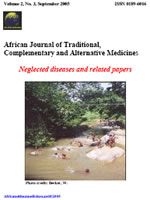
|
African Journal of Traditional, Complementary and Alternative Medicines
African Ethnomedicines Network
ISSN: 0189-6016
Vol. 14, No. 1, 2017, pp. 110-122
|
 Bioline Code: tc17012
Bioline Code: tc17012
Full paper language: English
Document type: Research Article
Document available free of charge
|
|
|
African Journal of Traditional, Complementary and Alternative Medicines, Vol. 14, No. 1, 2017, pp. 110-122
| en |
ISOLATION, CHARACTERIZATION AND IMMUNOCHEMICAL STUDIES ON FIBROUS PROTEINS FROM COWRY SHELL ( CYPRAEA MONETA  , LINNAEUS) , LINNAEUS)
Togun, R.A.; Balogun, R. O.; Adeyemi, D.O.; Esan, T.A.; Oyatogun, G.M; Oziegbe, E.O; Okonji, R. E. & Kuku, A.
Abstract
Background: Biomaterials are non-drug substances used to treat, enhance or replace functions of body tissues or organs. Natural sources of biomaterials have recently become the focus of several research activities. Cowry shell constitutes one of the most promising natural sources of biomaterials because of its chemical stability, biodegradability and biocompatibility in the body. However, its applications may be limited due to immunogenic and toxic responses that may occur following implantation, hence this study.
Materials and Methods: Crude fibrous protein extracted with citrate buffer from pulverised cowry shells (Cypraea moneta (L)), was resolved into two components (CSP1 and CSP2) by gel filtration. Immunological studies were performed with antisera obtained from rabbits by double immunodiffusion and immunoelectrophoresis techniques. Mice treated with the proteins were observed for signs of toxicity and their liver, kidney, lungs and spleen were processed histologically.
Results: The native molecular weight of CSP1 and CSP2 determined by gel filtration were 91kDa and 33kDa respectively. CSP1 and CSP2 displayed single bands on SDS-PAGE with subunit molecular weight values of 19kDa and 19.5kDa respectively. Antisera obtained from rabbits immunised with the crude citrate buffer extracts precipitated the antigen in double immunodiffusion tests. Histopathological examinations revealed a dose-dependent damaging effect of the shell proteins on liver, kidney, lung and spleen tissues of the treated mice.
Conclusion: This study showed that cowry shells contain fibrous proteins which are immunogenic and toxic in mice at relatively high concentrations, causing visible organ damage without concurrent physical manifestations.
Keywords
cowry shell protein; purification; immune activation; toxicity
|
| |
© Copyright [2017] - African Journal of Traditional, Complementary and Alternative Medicines
Alternative site location: http://journals.sfu.ca/africanem/index.php/ajtcam
|
|
